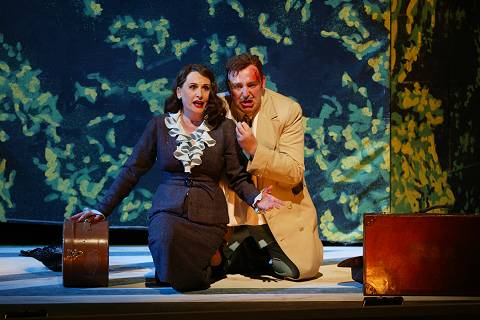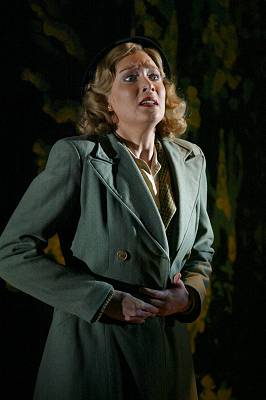|
<< -- 2 -- Roderic Dunnett A HAUNTING FUTURE

Letting tenor Jeffrey Lloyd-Roberts loose on Peter Quint (and also the
Prologue) was an inspired, overdue piece of casting. Lloyd-Roberts, already
a superb Albert Herring for Garsington and a potential Vere and Grimes,
hasn't the mellifluous voice of a Pears or Langridge or Bostridge : if anything,
he still tends to bark slightly. Hence the usual focus of the role -- his
calls to Miles, the sheer poetry of Myfanwy Piper's mischievous text, his
sinuous allure -- yielded to other aspects. When we first meet Quint, as
the Prologue, suitcase in hand, cigarette in hand like a louche car salesman,
and Miss Jessel trailing behind like a forlorn plaything, his temple is
shivered by an open and weeping scar. Mrs Grose's description of his death
-- cue horrific cello solo and then strings -- was especially horrid in Lionel
Friend's forever revealing handling of the score; here in the Prologue,
Britten's controlled orchestral build-up was especially fine-tuned.

Miss Jessel (Janis Kelly) and Peter Quint (Jeffrey Lloyd Roberts) in Britten's 'The Turn of the Screw' at Grange Park Opera. Photo © Clive Barda
|
Andrew Walsh's designs worked well : a spare ruralist frontdrop and onstage
a tiny Bly, like a castle on which the children in their wilder flights
of fancy mount, plus a terrifying skylight opening onto icy blues that suggest
some dire Jungian world beyond. Bly proper seemed to occupy a vast space,
as if we were indeed in the cavity of the head : a pertinent comment on
the Governess's imaginings (or otherwise).

Natasha Marsh as The Governess in 'The Turn of the Screw'. Photo © Clive Barda
|
Natasha Marsh's Governess had presence from the start, albeit a slight
dearth of tone when not singing full pelt. The omens are there already :
'Why did I come?' is sung to the music of Piper's Verlaine-based 'The ceremony
of innocence is drowned' -- darkness encloses the Jane Eyre-like girl even
in her initial forebodings.
The orchestration is everything : flute cavorting within the textures
as Mrs Grose introduces the children; violin solo at the first mention of
Miles; touches of oboe, pianissimo xylophone and horn, or bassoon pecking
like a warning bird : every orchestral utterance yields paradox. The Governess's
rapturous soliloquy has something of Budd, and something too of Aschenbach
to come. Fussing woodwind and then marimba herald her second sighting of
Quint. Her exchange with Mrs Grose, and the latter's revelation about the
manner of Quint's death, were as stark and lucid as could be.
Continue >>
Copyright © 15 September 2002
Roderic Dunnett, Coventry, UK

|

